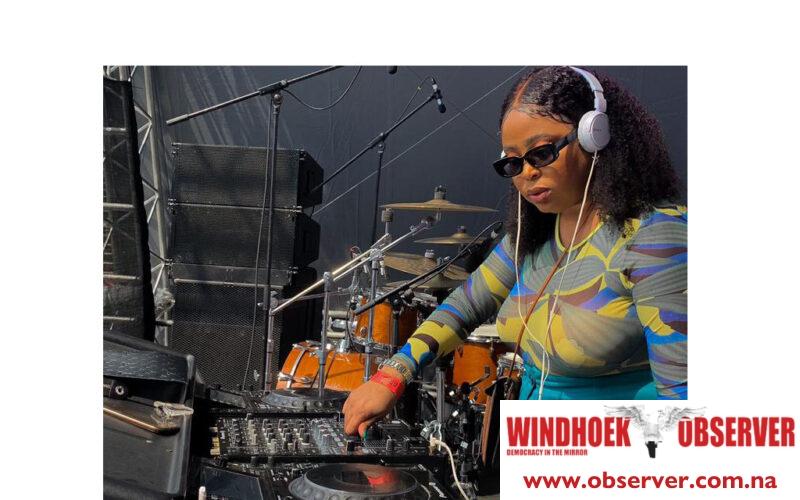Who is DJ Kiki and how did you get into the arts and music industry?
Before ‘DJ Kiki’ there’s a bigger brand name called ‘Felicia Mutonga’ which is the blue print from where DJ Kiki was born from within the creative industry. I am, an Electronic Media Studies Double Major Honours graduate. I come from from Katima Mulilo in the Zambezi Region.
The creative industry has always been in me. A passion that started from watching Oprah on TV as a 9 year old. From imitating broadcasters with the dream of wanting to be a TV presenter to co-hosting on radio by the time I was 16 years old. I permanently got into radio and TV presenting, as well as producing, acting, voice-over production, directing, photography, videography and what I’m fully known for now; Kiki the Disk Jokey (DJ).
Why take up music as a DJ?, what attracted you to it?
Being a DJ was never part of the plan and it was never a passion or anything like that. If anything, I’m supposed to settle on television more than on the decks.
I’ve always been a curious mind with vast knowledge of different genres in music and the traditional elements of sound; thanks to my dad. Being in spaces like Chopsis and watching the DeckGeeks, DJ Shox, LMA, Ace Da Bass rock the decks andbeing a constant customer always requesting for music.
As a multifaceted creative, I have a curiosity of always challenging myself to try out new things just to see how good I am at it. And so the curiosity to DJ’ng was born. Combining that and my love for sound and the constant nags of how much music we have in the world but a constant repetitive of sound; led to me arriving here.
Little did I know that once I arrive, DJ’ng will be a form of therapy to me. Something that helps me escape; and that’s what sound does to us all. It helps us heal.
How has your journey been as a woman in this industry?
I won’t sugarcoat anything. Many know how it has been and still is a struggle for me personally including many other women within the creative industry. Especially the DJ’ng one. It hasn’t been easy. I’ve cried on sets, I’ve cried behind closed doors. My crime? Putting my foot down, setting my standard, speaking my mind, refusing to conform and creating my own brand identity. In this industry the moment you refuse to bow to them, you become a threat.
As a woman you need to work 10 times as hard just to let people put respect to your brand. And you have to develop a thick skin because you will always be bullied. The worst of it all is how women DJ’s are never just seen as that; DJ’s. We are always compared to the next woman on some ‘female DJ’ prefix. Why can’t a female DJ just be as good as the next male?
I hate being called a female DJ cause then you’re boxing me and saying I’m not good enough outside of my gender. My response is to not get angry cause some don’t know any better, but to correct and educate and so I tell them always “I AM A DJ FIRST BEFORE I AM FEMALE”
Do you think being a DJ has made you a better person?
Yes, 100%. As a DJ you’re surrounded by so so many people from different walks of life with different characters. I sometimes see DJ’ng as you being the parent and the audience being your kids (no disrespect).
The audience, just like kids, are very demanding, can be entitled, sweet, kind, rude, honest, supportive, loving, hating etc.. It’s a whole different character you are dealing with. And I, on my weak traits, am very impatient, stubborn, emotional, strict and blunt.
Being a DJ dealing with so many characters in one night has taught me to be the opposite of my weak traits in order to accommodate others. Everyday I learn.
I am genuinely a kind person, who also comes with high levels of social anxiety and so I get overwhelmed easily and interacting becomes harder for me. But in that moment I always need to pose and remember; this people are here to support you, the least you could do is accommodate them. So yes, everyday it teaches me to be better within the community I exist in. Compromising is just as important for myself and those around me. I am because they are.
If you had to recall the first time you heard music in your life – what do you think it felt like?
The time is December, I must have been five years old on the Trans-Caprivi highway driving with my dad and uncle to Katima. Green scenery and my dad had his favorite road-trip playlist on; Singura music (the likes of Leonard Dembo), a combination of Lucky Dube’s discography, moving onto Matshikos, Patricia Majalisa, Splash, Dalom Kids.
That moment felt like peace. A memory I’ve held dear to me all my life.
The music I listen to when I’m in my own space versus that I play on deck. My dad influenced my sound on the decks and I’ll forever be grateful for that peace he instilled in my life.
How do you incorporate your culture into your art?
I’m a very very proud Caprivian. Something I advocate every chance I get.
I do so by Introducing the audience to music from home, playing in spaces that are home, collaborating on shows with artists from home and currently I’m in studio co-producing using traditional elements that represent my culture.




